Урок англійської у 8 класі
Творчість моїх учнів охоплює літературні проекти. При вивченні теми Письменники запропонуйте дітям творчі переклади. Це урізноманітнить урок, додасть свіжого подиху вашій роботі та заохотить учнів до творчості.
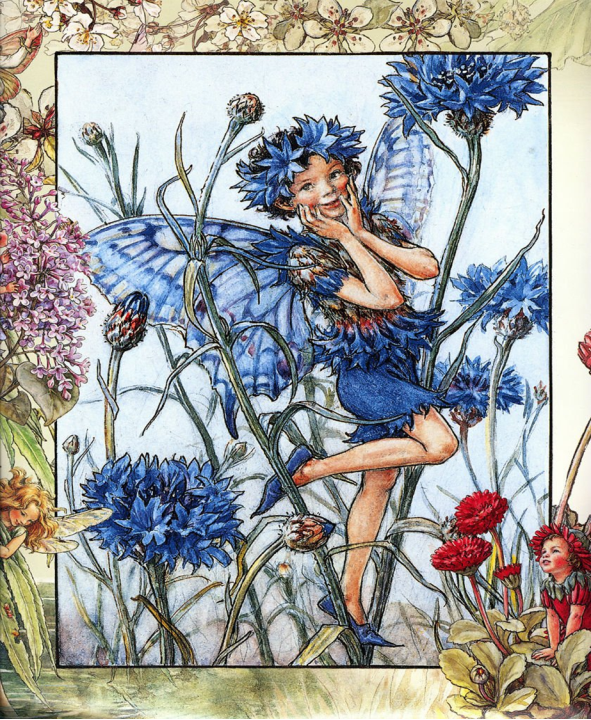
Flower Fairies of Cicely Mary Barker
Poetry is what gets lost in translation.
Robert Frost
A poem begins as a lump in the throat, a sense of wrong, a homesickness, a lovesickness.
Robert Frost
Poetry is when an emotion has found its thought and the thought has found words.
Robert Frost
.
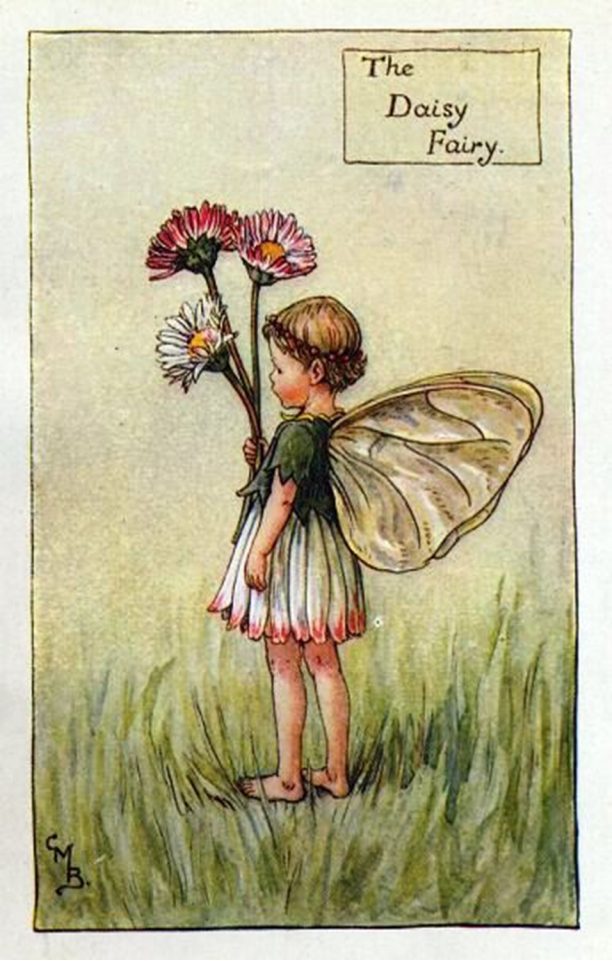
Come to me and play with me,
I'm the babies flower,
Make a necklace gay with me,
Spend the whole long day with me,
Till the sunset hour.
I must say Good-night, you know,
Till tomorrow's playtime;
Close my petals tight, you know,
Shut the red and white, you know,
Sleeping till the daytime.
Пісня феї маргаритки
Я-дитяча гарна квітка, Намисто веселе зі мною зроби
Звати мене маргаритка. Я доброї ночі бажаю тобі.
Ти мене не забувай, До завтра, побачимось під час гри,
Прийди до мене пограй. Пелюстки міцно мої загорни.
До заходу сонця триватиме гра Залиш їх поспати і хай бачать сни,
Наша дружба міцніша ніж дуба кора, Червоні і білі, як спалах весни.
ЧЕРВОНА АЛІНА
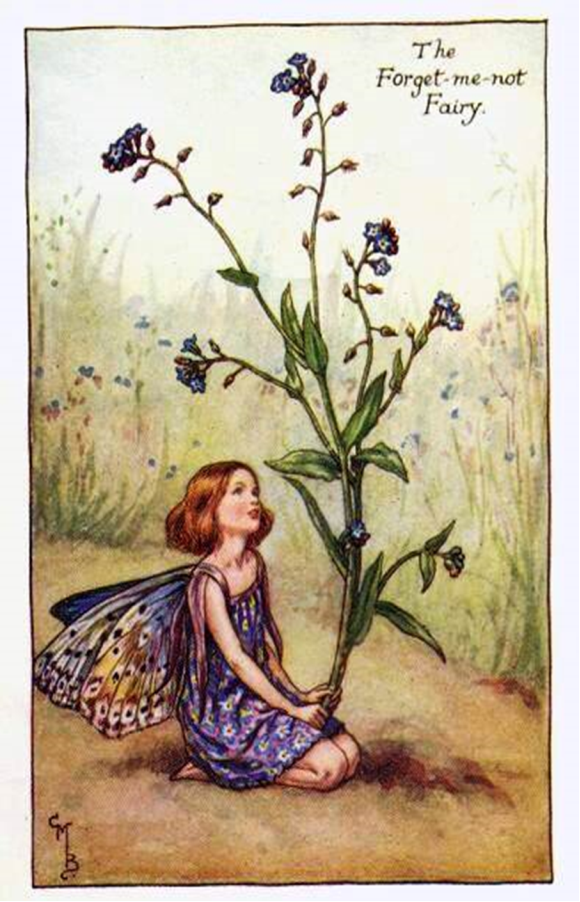
So small, so blue, in grassy places
My flowers raise
Their tiny faces.
By streams my bigger sisters grow,
And smile in gardens,
In a row.
I've never seen a garden plot;
But though I'm small,
Forget me not!
ПІСНЯ ФЕЇ НЕЗАБУДКИ
Незабудка
Така маленька, голуба
І на травичці мешкає вона.
Мої квітки обличчя підіймають
І майоріють струменем ріки.
Їх посмішка в саду сія в рядок
Ніколи я не зустрічала
Таких чарівних квіточок.
Нехай маленька я для вас
Та не забудьте мене враз!
НАСІННИК АНАСТАСІЯ
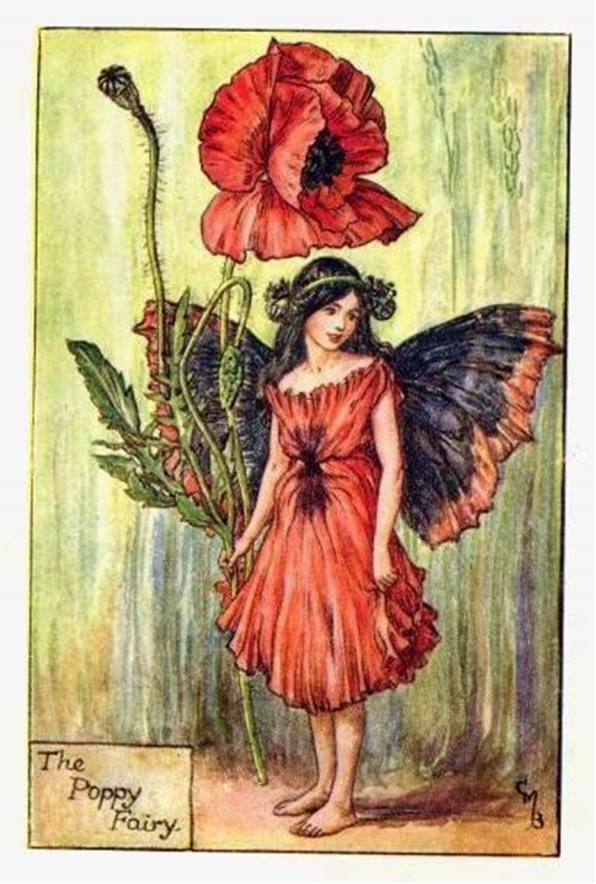
The green wheat's a~growing,
The lark sings on high;
In scarlet silk a~glowing,
Here stand I.
The wheat's turning yellow,
Ripening for sheaves;
I hear the little fellow
Who scares the bird~thieves.
Now the harvest's ended,
The wheat-field is bare;
But still, red and splendid,
I am there.
ПІСНЯ ФЕЇ МАКУ
Озима пшениця уже достигає
І жайворонок в небі під хмари злітає
Немов у пурпуровому шовку стою я
І милуюся жайворонком, що у небі кружля.
Вже осінь прийшла, все жито змела,
Урожай підібрала.
І тільки на радість для всіх
Червоний мак устояти зміг.
КАРАСЬ МАРІЯ
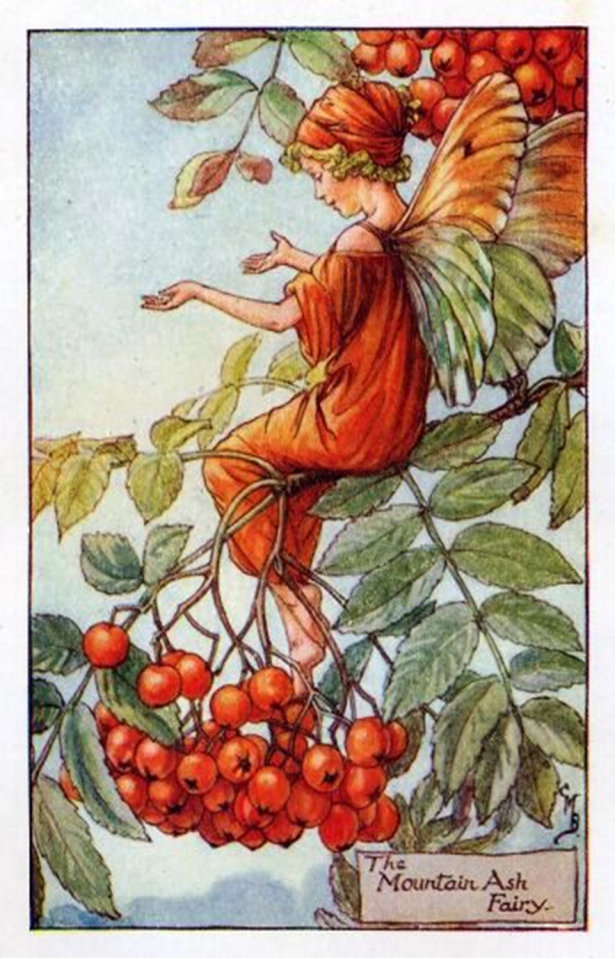
They thought me, once, a magic tree
Of wondrous lucky charm,
And at the door they planted me
To keep the house from harm,
They have no fear of witchcraft now,
Yet here am I today,
I've hung my berries from the bough,
And merrily I say:
"Come, all you blackbirds, bring your
wives, Your sons and daughters too;
The finest banquet of your lives
Is here prepared for you."
Пісня феї горобини
Мене чаклункою вважали,
Біля воріт своїх саджали,
Щоб захистити дім від зла,
Щоб оберегом я була.
Та вже чаклунства не бояться,
І ось сьогодні я
У пишнім вбранні ягід
Весело промовляю:
“Летіть сюди,чарівні птахи,
Під гілля густого намет.
Нехай родинам вашим
Буде чудовий банкет”.
КАРАСЬ МАРІЯ
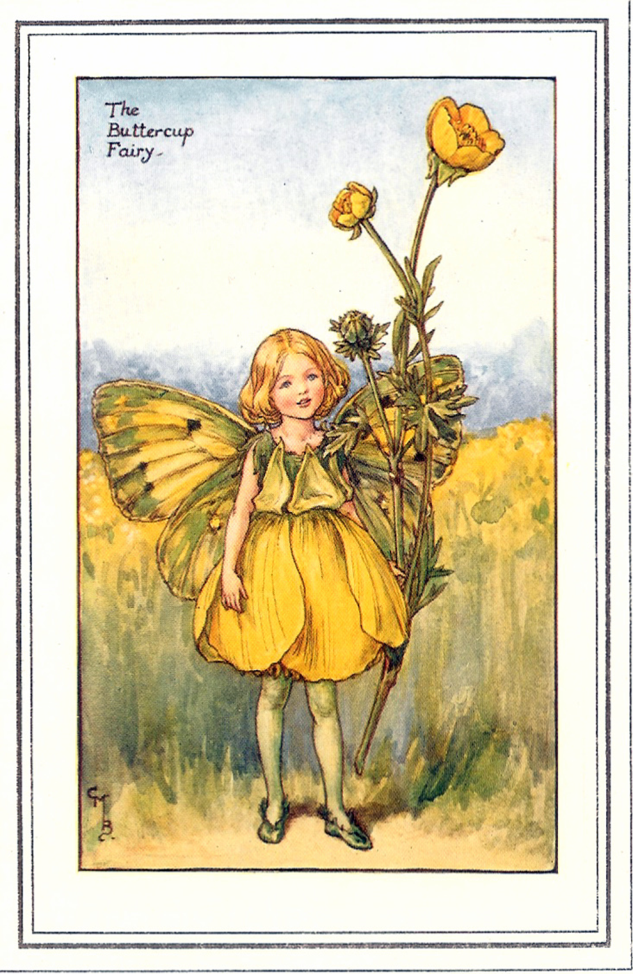
'Tis I whom children love the best;
My wealth is all for them;
For them is set each glossy cup
Upon each sturdy stem.
O little playmates whom I love!
The sky is summer-blue,
And meadows full of buttercups
Are spread abroad for you.
ПІСНЯ ФЕЇ ЛЮТИКІВ
Я-найулюбленіша квітка Це все для вас,
І для дорослих, і для діток. Для мене і для тебе.
Для них набір блискучих чашечок,
Над кожною тичинкою-жучок.
З маленькими друзями гратись люблю,
Всі барви веселки я їм подарю.
Для них-багатство все моє,
Уся краса,що в мене є.
Роса в степу і повні лютиків поляни,
Котрі є всюди, де я не погляну.
По-літньому блакитне небо-
ЧЕРВОНА АЛІНА
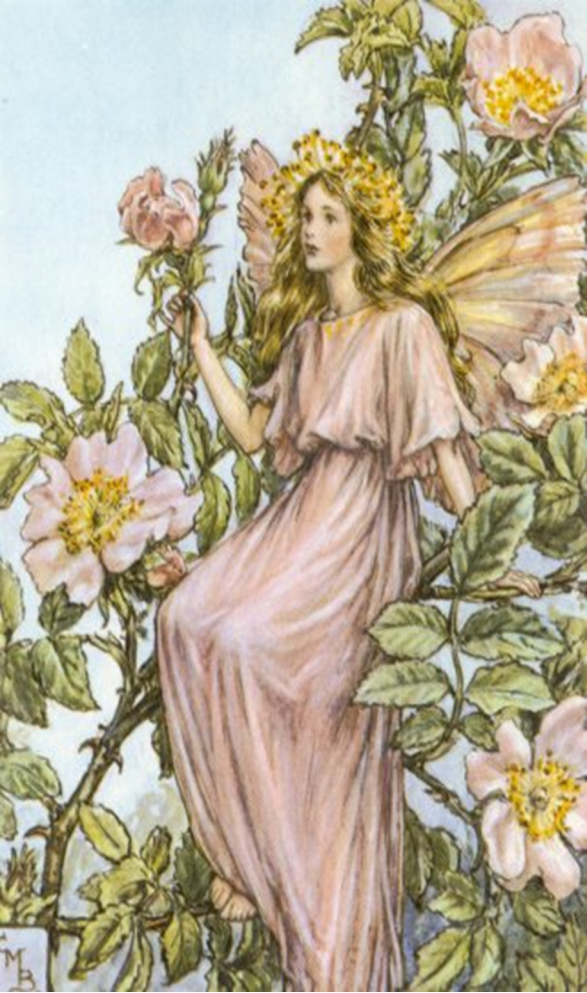
I am the queen whom everybody knows,
I am the English Rose;
As light and free as any Jenny Wren,
As dear to Englishmen;
As joyous as a Robin Redbreast's tune,
I scent the air of June;
My buds are rosy as a baby's cheeck;
I have one word to speak,
One word which is my secret and my song,
'Tis "England, England, England" all
day long.
ПІСНЯ ФЕЇ ТРОЯНД
Я англійська троянда,яку всі знають. Мої бутони рожеві, як щічки дітей
Світла та вільна, як Дженні Рен Кажу я лиш слово з усіх речей.
Троянда.яку всі кохають. Це моя пісня і мій секрет
Радісна, як музика, що лине, Англія, Англія- це з троянд букет.
Як подих Червня, що плине.
НАРОХА АНАСТАСІЯ
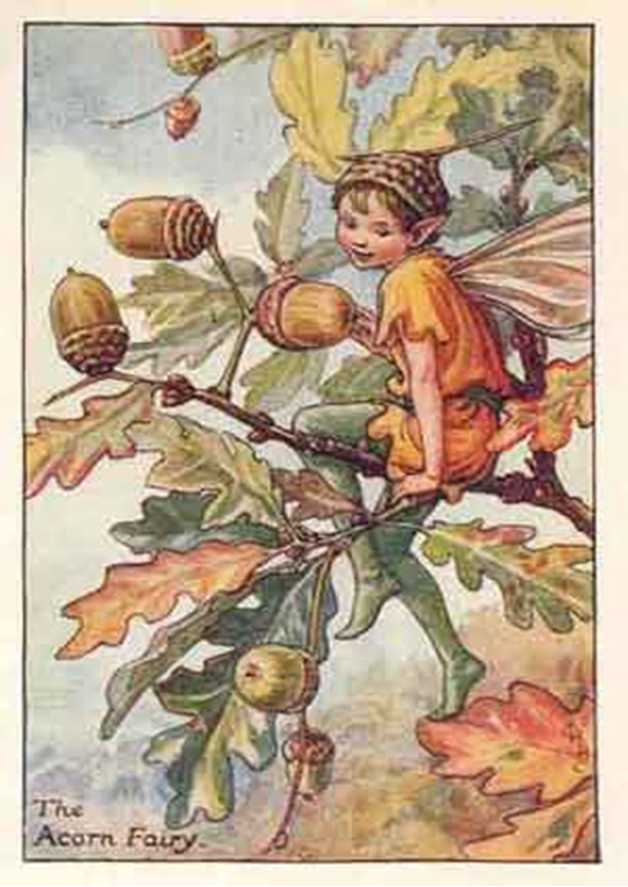
To English folk the mighty oak
Is England's noblest tree;
Its hard-grained wood is strong and
good As English hearts can be.
And would you know how oak-trees grow,
The secret may be told:
You do but need to plant for seed
One acorn in the mould'
For even so, long years ago,
Were born the oaks of old.
ПІСНЯ ФЕЇ ДУБА
У повазі англійські дуби,
Величезні зростають вони.
Така міцна деревина ця,
Як гарячі англійські серця.
Ох , чарують око дуби,
А чи знаєте ви як зростають вони,
Закриваючі сонячні промені.
Щоб могутні зростали дуби,
Чари феї в нагоді завжди.
Доглядає за ними і вдень і вночі
Поки зовсім маленькі вони
Ось такі загадкові секрети.
КАРАСЬ МАРІЯ
Flower legends
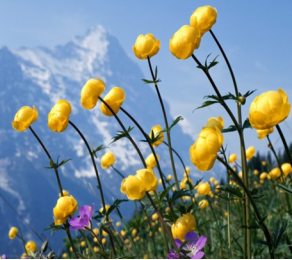
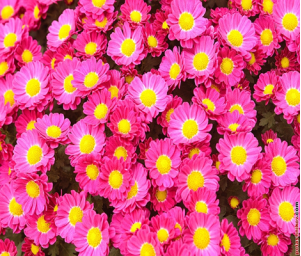
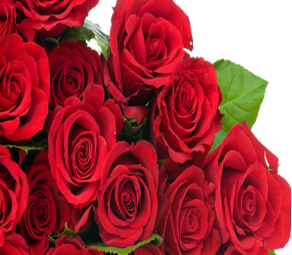
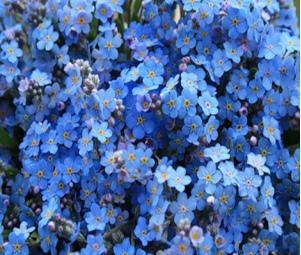
Daisy
According to an ancient Celtic legend, daisies came from the spirits of children who died at birth. To cheer up their parents, God sprinkled the flowers all over the earth. This legend is the reason why daisies have the meaning of innocence.
The ancients dedicated it to Artemis, the goddess of women. In Wales during the Middle Ages, daisies were used to cure insanity, treat smallpox, tumors, jaundice and skin disease.
The Countess of Kent practiced medicine in her home. She invented the ~Countess of Kents powder,~ with the common daisy and other expensive drugs, for malignant and pestilent diseases. It was expensive and beyond the means of common sufferers. King Henry VIII ate daisies to relieve his stomach ulcer pain.
There is an old English saying that spring has not come until you can set your foot on twelve daises. Dreaming of daisies in the spring or summer is good but if in the fall or winter it is bad luck. Everyone knows the ~he loves me, he loves me not~ rhyme with which one learns the fate of a romance by plucking a daisy's petals. Eating the roots is said to stunt a child's growth, but eating three of the blossoms after a tooth extraction means one will never have another toothache. King Henry VIII ate dishes of daisies to relieve himself from his stomach-ulcer pain. In Italy, the young leaves, though small, were eaten in salads.
The Lakeside daisy is an endangered daisy. It occurs only in the Lakeside Daisy Preserve, in the state of Ohio, USA, and only at two other sites, both in Ontario, Canada.
Rose
There is a Talmudic legend, that tells how the rose became red. At midnight before the vernal equinox, when Cain and Abel were to make their offerings to the Lord, their mother, Eve had a vision. She saw a little lamb bleeding its life away on Abel's altar, and the white roses he had planted about it were suddenly full blown and red. Voices cried about her, as in despair, but they died away and only a wonderful music was heard instead. Then, as the shadows lifted from her eyes, a vast plain unfolded, more beautiful than the paradise she had left, and grazing there were flocks watched by a shepherdwhose robe of white was so fine and shining that the eye was dazzled by it. He wore a wreath of roses which Eve recognized as having lately grown about the altar, and he struck the strings of a lute, waking entrancing harmony. Day broke, and, dismissing the vision as an idle dream, Eve watched her sons as they went forth to make sacrifice to the deity. She heard the cries of the little creatures of the flocks as they were put to death, and was glad that her children were willing to do this thing in the belief that suffering was agreeable to the author of life and love. At evening her sons were still afield, and as darkness came she went to seek them. Her dream returned to her, and she was disturbed. The fires on the two altars had burned out, and the bodies of the lambs were charred and broken. From a cave hard by sounded roarings of despair: she knew the voice for Cain's. And before his younger brother's altar lay the most pitiful sacrifice of all: the body of Abel, cold and rigid; and his blood had bespattered all the roses he had planted. Eve sank upon the body of her son, and again the vision of the night returned: she saw the shining one again, and it was Abel who shepherded in the new paradise. He wore the roses, but they were beautiful and fragrant, and, striking the harp in a triumphant measure, he sang, "Look up and see the stars shining promise through your tears. Those cars of light shall carry us to fields more blooming than Eden. There sighs and moans change to hymns of rapture, and there the rose that has been stained with innocent blood blooms in splendor."
Rose Completion, Achievement, Perfection. Meanings vary depending on the color, shape and number of petals. For example, the blue rose symbolizes the impossible, the golden rose the pinnacle of achievement, an eight petal rose regeneration.
Forget-Me-Not
Forget-me-not retains its legends in its name. According to legend, a young man and his sweetheart were walking beside the Danube when they came across some blue flowers that grew on an islet in the stream. The man leapt into the river to pluck them for her, regardless of the current and the protest of the girl. He crossed safely, plucked the flowers and was almost at the bank again when he was wrung by a cruel cramp, and could not hold his way against the whirl and surge of the rapid. He looked into the white face of his beloved, and flung the bouquet at her feet with his last strength, cried, ~Forget me not!~ and disappeared. She never forgot him, and wore the flowers in her hair until her own death.
Another legend tells of a wayfarer in a lonely valley who sees a flower at his feet he had never before seen. He picked the flower, and immediately the mountainside opened. He entered and saw rich stores of gold and precious gems. He began to gather them, but dropped the little flower, which murmured faintly, ~forget-me-not.~ The wayfarer was so intent on the possessions before him, he ignored the plea. The rift in the mountain began to close, and he barely had time to escape. But, alas! the little flower that had opened the treasure-cave was lost forever.
According to Christian lore when God was walking through the Garden of Eden after the Creation, He noticed a small blue flower and asked its name. The flower, overcome by shyness, whispered, 'I am afraid I have forgotten, Lord.' God answered, 'Forget Me not. Yet I will not forget thee.'
Poppy
Poppy comes from the Greek word ~rhoeas~ meaning ~red.~ Papaver is Latin, meaning ~pap,~ the opium poppy's milky juice. Oriental poppies contain opium which has been used for centuries. The corn poppy does not contain opium.
Poppies were found in Egyptian tombs dating back 3,000 years. According to the Romans the poppy could heal a love wound and they used it for witchcraft. The ancient Greeks used poppies as a love charm and thought that they were a sign of fertility and brought health and strength so Greek atheletes were given mixtures of poppy seeds, honey, and wine.
According to Greek legend, the poppy was created by Somnus, the god of sleep, to help Ceres, the corn goddess, who was exhausted by the search for her lost daughter that she couldn't make the corn grow. The poppies soothed her to sleep, and when she rested, the corn grew again, giving rise to the belief that the presence of poppies was essential to grow corn.
Demeter,so the legend goes, created the poppy for the purpose of getting some sleep after the loss of her daughter Persephone. The twin brothers Hypnos and Thanatos (Sleep and Death) were represented as crowned with poppies or carrying poppies in their hands. Obviously the Greeks were aware of the fact that a merciful sleep induced by opium could lead to death.
Another story about the poppy tells us that a bad witch had transformed a woman into a poppy. From that day on the woman lived on the field with the other poppies and was allowed to visit her family only at night time. One night the woman told her husband that if the next day he will pick her poppy the spell will be broken. In the morning the man went to the field and saw hundreds of poppies there, all looking alike. After looking at each of them, the man knew which one was his wife because that poppy was the only one not wet by the morning dew, since the woman had spent her night at home. When he picked that poppy the spell was broken and they lived happily ever after.
In New Zealand the term ~Tall Poppy~ is used to describe people who stand out above all others. The ~Welsh Poppy~ is yellow. ~Corn Rose~ was the name given in Roman times to the wild Poppy, which was often found growing in fields of corn. ~Smoke of the Earth~ is the name given in the Middle Ages to the Poppy. The smoke of the burning plant was said to cast out evil spirits.
The poppy was noticed during the Napoleonic Wars, as the mysterious flower that bloomed around the fresh graves of fallen soldiers. After the 1914-18 war the shell holes, and graves on the battlefields in Flanders, filled with poppies. The Poppies were said to have come from the spilt blood of war. It is an emblem that commemorates those who died in wars.
It was known to the Assyrians and was introduced into England by the Romans. Christianity gave its symbolism a new twist. Carved into the benches of some medieval church pews it represented the belief that we rest in anticipation of the Last Day.
The plant has many healing qualites apart from that of narcotic. Morphine and Codeine are two familiar drugs made from the poppy. Opium was also the main reason for England's war with China in 1839. For centuries opium has been cultivated in India.


про публікацію авторської розробки
Додати розробку
